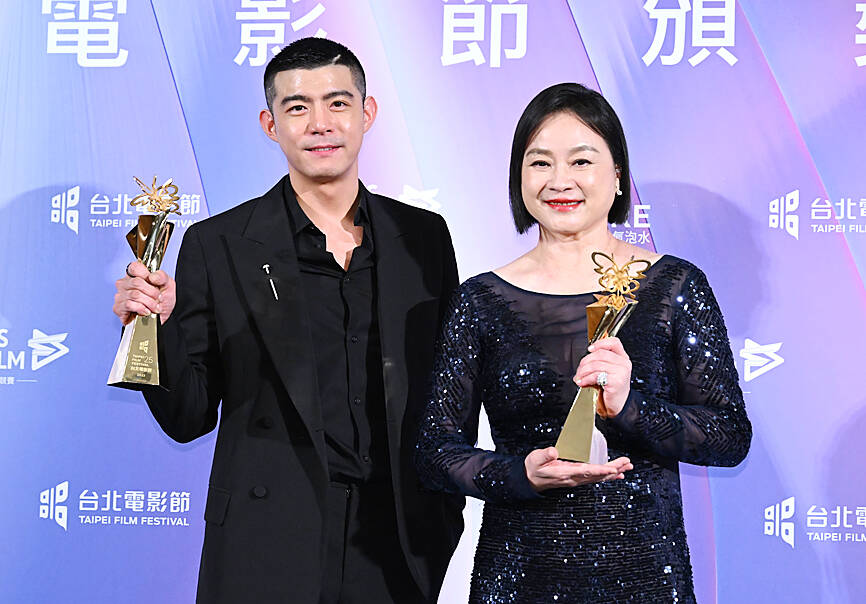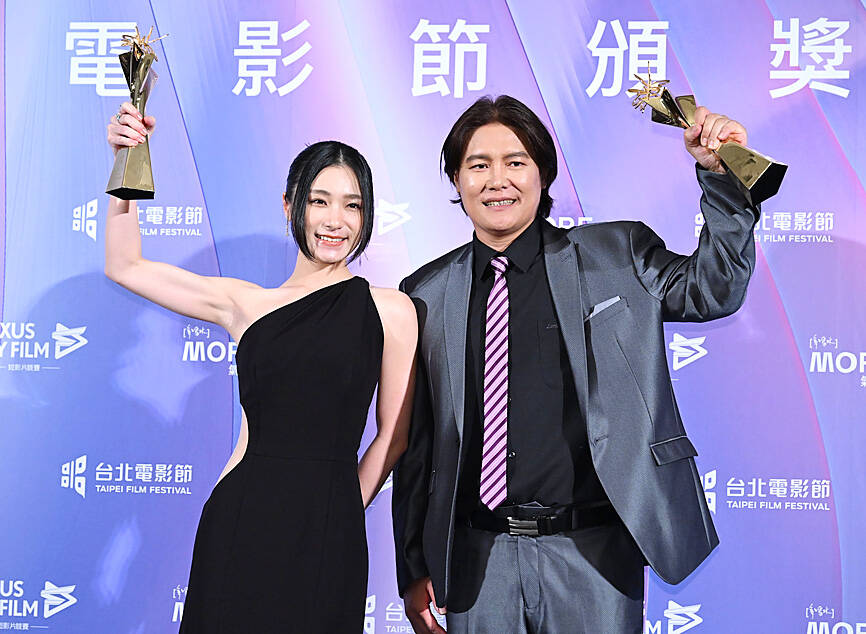Diamond Marine World (鑽石水族世界), a documentary about an ambitious Taiwanese man struggling to survive in Myanmar, was awarded the Grand Prize and Best Documentary awards at the Taipei Film Awards on Saturday.
The film by director Huang Hsiu-yi (黃琇怡) documents the journey of a Taiwanese shrimp farmer who plans to make a fortune by starting a venture in Myanmar, but is accused of criminal activities shortly after arriving there.
Diamond Marine World is a film about Taiwanese trying to chase prosperity in Southeast Asia, Huang said after accepting the Grand Prize, which includes NT$1 million (US$31,918) in prize money.

Photo: Hu Shun-hsiang, Taipei Times
She added that “it is a story about trust, love and forgiveness.”
The jury said Huang’s documentary showed her ability to sift through the vast amount of footage she had shot in Myanmar and condense it into an “honest and touching” work about the struggles of people with different values and cultural backgrounds.
The jury also commended Huang for her dedication to the work, highlighting that she had filmed in Myanmar for several years on an “extremely tight budget.”

Photo: Hu Shun-hsiang, Taipei Times
Huang received a grant of NT$800,000 from the government-funded National Culture and Arts Foundation in 2019 to make the documentary, government data showed, but the film’s total budget is unknown.
This year’s Best Narrative Feature Award was given to Gaga (哈勇家), a story about an Atayal tribal family struggling to cope with one unfortunate incident after another.
With an absurd local election as the backdrop, Gaga delicately presents the close bond between the members of the Atayal family and the various challenges facing them and their tribe, the jury said.
Director Laha Mebow (陳潔瑤), who is an Atayal, said in her acceptance speech that it takes a lot of passion to work in the film industry, because “there is often more agony than joy” in the filmmaking process.
Mebow said she would embrace this pain and continue making films to tell more stories about Taiwan’s indigenous people.
Saturday’s big winner was director Lin Chun-yang’s (林君陽) film Eye of the Storm (疫起), which was awarded the Best Director, Best Actor, Best Art Design, Best Visual Effects and Outstanding Artistic Contribution awards.
The movie, inspired by the 2003 SARS outbreak in Taiwan, portrays a group of young medical workers grappling with a deadly disease and tense human relationships in a hospital that has been sealed off.
The Outstanding Contributions Award went to photographer Liu Chen-hsiang (劉振祥) in recognition of his still images for movies made by award-winning directors Hou Hsiao-hsien (侯孝賢) and Chung Mong-hong (鍾孟宏).
The Best New Talent Award was shared by Wilang Lalin (洪金輝) for his role as a father struggling with uncertain future prospects in Gaga, and Yeh Hsiao-fei (葉曉霏) for her role as a student protester in the coming-of-age film Who’ll Stop the Rain (青春並不溫柔).
The Taipei Film Awards received 292 submissions: 40 feature films, 61 documentaries, 160 short films and 31 animations. Of those, 29 films were nominated for the competition, the awards organizers said.

The CIA has a message for Chinese government officials worried about their place in Chinese President Xi Jinping’s (習近平) government: Come work with us. The agency released two Mandarin-language videos on social media on Thursday inviting disgruntled officials to contact the CIA. The recruitment videos posted on YouTube and X racked up more than 5 million views combined in their first day. The outreach comes as CIA Director John Ratcliffe has vowed to boost the agency’s use of intelligence from human sources and its focus on China, which has recently targeted US officials with its own espionage operations. The videos are “aimed at

STEADFAST FRIEND: The bills encourage increased Taiwan-US engagement and address China’s distortion of UN Resolution 2758 to isolate Taiwan internationally The Presidential Office yesterday thanked the US House of Representatives for unanimously passing two Taiwan-related bills highlighting its solid support for Taiwan’s democracy and global participation, and for deepening bilateral relations. One of the bills, the Taiwan Assurance Implementation Act, requires the US Department of State to periodically review its guidelines for engagement with Taiwan, and report to the US Congress on the guidelines and plans to lift self-imposed limitations on US-Taiwan engagement. The other bill is the Taiwan International Solidarity Act, which clarifies that UN Resolution 2758 does not address the issue of the representation of Taiwan or its people in

US Indo-Pacific Commander Admiral Samuel Paparo on Friday expressed concern over the rate at which China is diversifying its military exercises, the Financial Times (FT) reported on Saturday. “The rates of change on the depth and breadth of their exercises is the one non-linear effect that I’ve seen in the last year that wakes me up at night or keeps me up at night,” Paparo was quoted by FT as saying while attending the annual Sedona Forum at the McCain Institute in Arizona. Paparo also expressed concern over the speed with which China was expanding its military. While the US

SHIFT: Taiwan’s better-than-expected first-quarter GDP and signs of weakness in the US have driven global capital back to emerging markets, the central bank head said The central bank yesterday blamed market speculation for the steep rise in the local currency, and urged exporters and financial institutions to stay calm and stop panic sell-offs to avoid hurting their own profitability. The nation’s top monetary policymaker said that it would step in, if necessary, to maintain order and stability in the foreign exchange market. The remarks came as the NT dollar yesterday closed up NT$0.919 to NT$30.145 against the US dollar in Taipei trading, after rising as high as NT$29.59 in intraday trading. The local currency has surged 5.85 percent against the greenback over the past two sessions, central